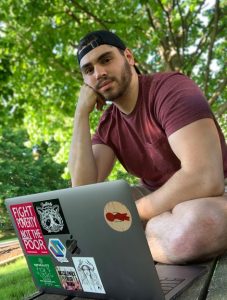This piece of writing started in my apartment, which sits on a little hill. Rabbits and chipmunks live in and around the hill—some under the stones that lead up to the building door—and squirrels and birds make home the few trees around my building.  This writing continued there, then in my office in the Writing, Rhetoric, and American Cultures program at Michigan State University, where I’m a third-year PhD student, and then at coffee shops around Lansing and East Lansing. The sentence was written in my office, and I just finished a particularly nice batch of overnight oats.
This writing continued there, then in my office in the Writing, Rhetoric, and American Cultures program at Michigan State University, where I’m a third-year PhD student, and then at coffee shops around Lansing and East Lansing. The sentence was written in my office, and I just finished a particularly nice batch of overnight oats.
To tell a dissimilar compositional history of this essay, I’m writing on land that is the occupied “ancestral, traditional, and contemporary Lands of the Anishinaabeg – Three Fires Confederacy of Ojibwe, Odawa, and Potawatomi peoples” (“Land Acknowledgement”). The laptop I use to write these sentences was purchased in my hometown of San Antonio, TX, which was the home of the Payaya Indians before European invasion. The oats? I have no idea where the strawberries, bananas, and blueberries were grown, and the oatmeal itself, though good, has a similarly unknown origin. Here I am eating and working—and wondering.
Both stories share a truth beyond the communicative goal to tell you, reader, that I am writing an essay. My interest in digital rhetoric stems from the work my fingers are doing right now (i.e., typing this sentence) but mainly where that work takes place. I’m here to let you know that I am interested in digital rhetoric in how Angela Haas tells us that digital “refers to our fingers, our digits, one of the primary ways (along with our ears and eyes) through which we make sense of the world and with which we write into the world” (“Wampum” 84). In that sense, my history with digital rhetorics is long: I played with Legos as a child, building complex histories out of playthings; I apprenticed as a florist for three years, making floral compositions and bleeding from rose thorns; I worked as a newspaper copyeditor and designer, training my fingers to design and edit through keyboard shorts, precise mouse movements, and pattern learning. I’m also a millennial, so most of my life exists online in various platforms. My fingers show a digital rhetorical history with calloused fingers, achy bones, and quick typing.
I foreground my body here because of my background in cultural rhetorics and to springboard into the work I am most interested in as a doctoral student in writing and rhetoric and as a computers and writing researcher. As a graduate student invested in internet studies, platform rhetorics, and community-engaged work, the digital plays out in what I study and how I study. In the same way my fingers type a sentence that exists online, my body and your body are invoked in this communicative instance, and I am intrigued by the complications that arise when we attend to where we are. As I point to the colonial legacy of my work locations, so too do you have an obligation to learn the history of the Indigenous peoples whose land you are on. In that vein, I am particularly intrigued in how the internet physically operates as a complex network of copper wires, servers, and electricity. As Dustin Edwards puts it, “How do [we] understand the temporalities involved in storing data on colonized lands & cooling them using water from rivers of empire? How do [we] viscerally make sense of the damages of networked digitality?” Edwards’ questions condense well the inquisitive tracks I take to cultural rhetorics and digital rhetorics research.
As a Twitch streamer, I research how I embody a community in my streaming for an audience comprising other queer men from around the world, as well as the rhetorical-relational work afforded by the platform rhetorics of Twitch. As a Twitter user, I examine how queer people tweeting about their sexual health call on researchers to attend to the context, place-specific factors of their health in extracting the knowledge outward to make conclusions about sexual health. As a first-year writing instructor, I am interested in the colonial legacies inherent in the things we use to make things as part of land-based design practices—where the metals and minerals that make our computers come from and whose lands they are from. I’m ready and eager to share these approaches to research and work with the broader DRC community, and I’m also very happy to learn amongst my cohort of graduate fellows. Here’s to a fun, productive fellowship tenure! You can head to my website to learn more about me and my research. And feel free to follow me on Twitter (@willflowers) or email me to connect (floreswi@msu.edu)!
